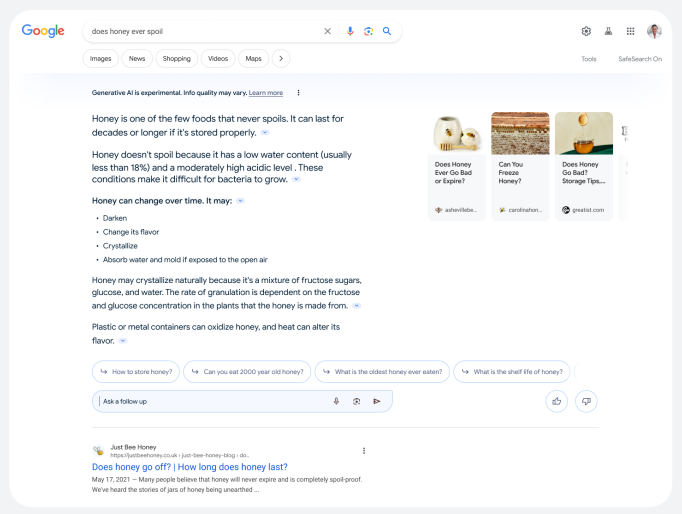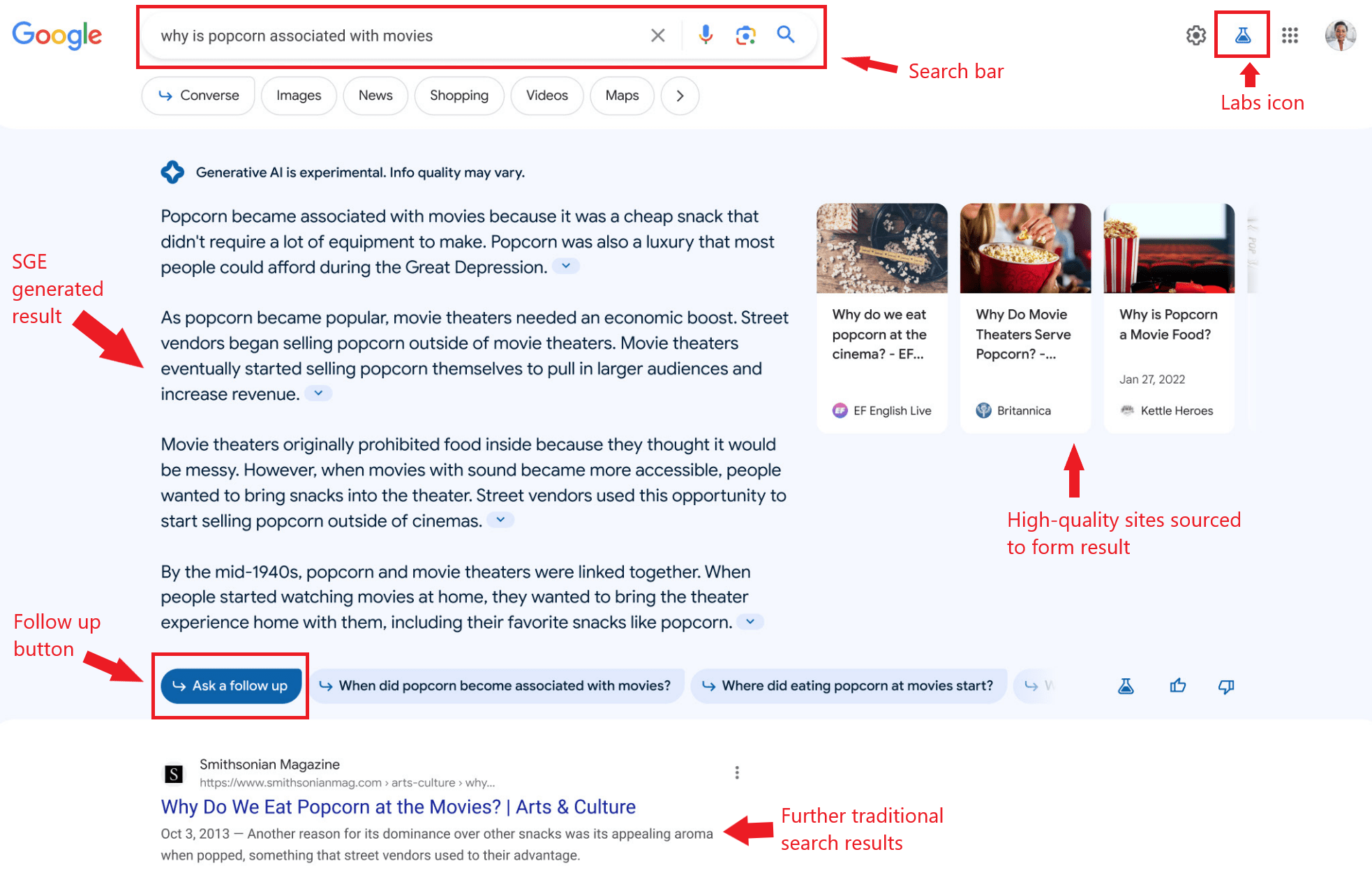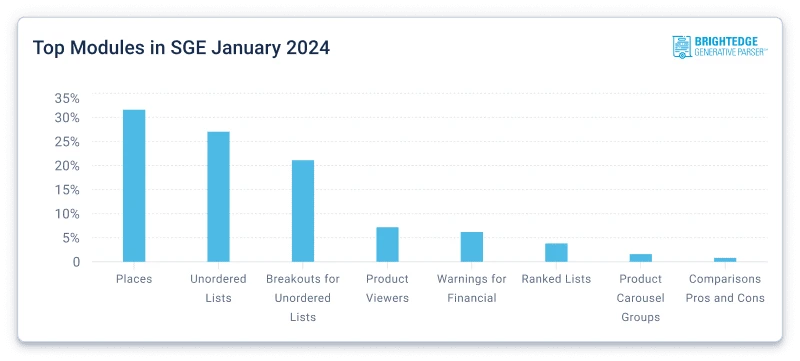Google’s Search Generative Experience (SGE) has been on the cards for a while and has been in testing for an extended period but is now live and accessible to the public. SGE is Google's way of bringing AI into search results and provides users with an AI generated search result depending on the query that is inputted. An AI generated result can now be generated for anything from asking for a specific recipe, finding the best places to go in a city or asking how to mend a cupboard door. This result will be shown to users above the standard search results.
With various versions and changes over time, Google finally launched SGE to the public in the US as of May 2024. While SGE has officially launched, it is currently only live fully in the US. However, SGE results are also now starting to be shown for logged in users in other regions, such as the UK. The idea of SGE is to harness innovative generative AI (Artificial Intelligence) technology to transform search results, offer concise search engine result page (SERP) overviews, and simplify web browsing. At its core, SGE is designed to provide users with all the information to their search query within the SERP itself, so that they do not have to click to an external site to find the same information.
As you can imagine, SGE has already impacted organic search and has changed the search landscape. While organic traffic and SEO are still going to be vital to every business, SGE adds an additional layer to this, and we are yet to see the full effects here in the UK. SGE presents a challenge to overcome, and several factors are still unknown.
Therefore, our expert team here Optix decided to take a deep dive into what exactly is SGE, how it works and what we can expect over the coming years and months, as well as how we can help your business adapt your marketing strategy to make the most of its influence.
Let's dive into what search generative experience is, how it works, and why it's making waves.
What Exactly is Search Generative Experience?
In Google’s words, “SGE is an early step in transforming the Search experience with generative AI. When using SGE, people will notice their search results page with familiar web results, organized in a new way to help them get more from a single search.
With generative AI in Search, people can:
Ask new questions that are more complex and descriptive
Get the gist of a topic faster, with links to relevant results to explore further
Get started on something you need to do quickly, like writing drafts or generating imagery right from where you're searching
Make progress easily, by asking conversational follow-ups or trying suggested next steps"
Essentially, with Google SGE, users can access quick overviews of search topics, conveniently displayed at the top of search engine result pages. These summaries help users identify relevant portions of web pages and explore new ways to phrase their queries, much like ChatGPT, Bing Chat, or Bard.
See the screenshot below to understand what this looks like in situ:

For example, where previously you may have typed a question into Google and then clicked on the most relevant result to get your answer, now, SGE will in essence crawl the web to pull together the most accurate and relevant information to answer your question. This is demonstrated in the screenshot above.
A Brief SGE History
As a basic overview, SGE has evolved through Google's REALM, RETRO, and RARR models, making use of language models and relevant documents to provide accurate and informative search results.
To dive deeper into the topic of how SGE works, this article from Search Engine Land contains the most detailed explanation: https://searchengineland.com/how-search-generative-experience-works-and-why-retrieval-augmented-generation-is-our-future-433393
In summary, Google introduced Search Generative Experience (SGE) in August 2020, starting with "Retrieval-Augmented Language Model Pre-Training (REALM)."
REALM identifies and extracts valuable information from full documents, offering improved accuracy compared to traditional language models.
Google's DeepMind team extended this idea with "Retrieval-Enhanced Transformer (RETRO)," a similar model with enhanced context comprehension, resulting in more coherent text than REALM.
They further developed "Retrofit Attribution using Research and Revision (RARR)," which doesn't create text from scratch but refines existing passages, delivering accuracy and informativeness at a potential computational cost.
SGE combines PaLM 2 and MuM language models with Google Search components, using the document index and Knowledge Vault to fine-tune responses.
This has all lead to 2024, when Google officially launched SGE to the public (US only at time of writing).
How Does Search Generative Experience Work?

There are multiple aspects of SGE that contribute to its workings and how it displays information for the user. These include:
AI Snapshot
When appropriate, SGE will show an AI-powered snapshot to help people quickly get an overview on a topic, with factors to consider and helpful information.
These snapshots serve as a starting point from which people can explore a wide range of content and perspectives on the web. SGE will show links to resources that support the information in the snapshot, so people can check the information themselves and explore further.
Follow-up Questions
SGE narrows down results based on user queries, creating a more contextually relevant search experience. People can tap to “ask a follow up” where they can refine what they’re looking for or explore an edited version of the query without having to restate context. Or, you can tap suggested next steps to discover relevant information or questions they may not have known to ask about to keep exploring. This will generate a new overview with fresh information and additional links to other resources that users can then explore.
Vertical Experiences
SGE is also able to create information journeys for queries on subjects such as shopping or local searches, as they often have multiple angles or dimensions to explore. In shopping, for example, SGE can help uncover key product information, so people can make purchase decisions faster and easier. For product searches, SGE will capture noteworthy factors to consider and a range of product options. SGE also provides product descriptions that include relevant, up to date reviews, ratings, prices and product images.
Are There Any Limitations to Search Generative Experience?
As Google states, “There are known limitations with generative AI and LLMs, and Search, even today, will not always get it right. We’re taking a responsible and deliberate approach to bringing new generative AI capabilities to Search. We’ve trained these models to uphold Search’s high bar for quality, and we will continue to make improvements over time. They rely on our hallmark systems that we’ve fine-tuned for decades, and we’ve also applied additional guardrails, like limiting the types of queries where these capabilities will appear.” Some key limitations include:
Misinterpretation during corroboration
There are instances where SGE has identified information to corroborate its snapshot but misinterprets the language which then changes the meaning of the output.
Hallucination
Like all LLM-based experiences, SGE may sometimes provide incorrect facts and figures or inaccurately identify insights.
Bias
The data that SGE is trained on is based on high-quality web data that it has extracted. This can lead to narrow representations of people or potentially provide negative contextual associations.
This is a challenge that occurs in standard search results today. For example, general queries about sport may bias to providing results towards men’s players or teams, even if information about women players or teams is an equally or perhaps even more accurate response.
Opinionated content implying persona
While SGE is designed to reflect a neutral, objective tone in its output, there may be instances where the output reflects opinions that exist on the web, making it seem that SGE has an opinion or persona.
Duplication or contradiction with existing Search features
Because SGE is integrated into standard search alongside other results and features on the search results page, it’s possible for SGE results to be in contradiction with other information in those results.
Furthermore, Google currently won’t reveal any real data to us about whether AI answers are driving clicks to websites, click-through rate data, or advertising performance data on what we are calling CHERPs, or Chat Engine Results Pages. This presents a significant challenge in reporting on any SGE data.
We Still Need to Be Cautious With Using SGE
While SGE has its advantages, it is clear already that it still needs a fair amount of work and input to ensure that the results it is providing users are as accurate as possible. Since its launch, there have already been some entertaining examples of misinformation being provided, including advising someone to put glue on their pizza to help the cheese stick to the base and to eat one rock a day to stay healthy (who knew!).
These examples may be comical, but there is also real risk in some of the results being provided. This includes one answer to a query of ‘how to cope with depression’ being to “jump off the Golden Gate Bridge”, which is not only inaccurate, but it also is dangerous and poses a genuine risk to users. Unfortunately, due to how LLM’s work, these types of answers are more common than you would think.
While all LLM models are bound to offer incorrect results, examples such as above highlight that there is still some way to go to ensure that the information being provided is taken from authoritative, relevant and safe sources.
How Will SGE Change Search? Measuring the Impact
The introduction of generative AI is reshaping the world of SEO. But what does this mean for the traditional methods of surfacing information through paid and organic channels?
SGE is poised to influence organic search results in both positive and negative ways, as Google aims to make searching faster, more insightful, and easier. As a result, this is bound to affect multiple metrics that we would use to measure organic performance, including keyword rankings, CTR (Click Through Rate), clicks, impressions, sessions and more.
For example, currently SGE is best at answering long-tail queries and questions. Some sources suggest that because of this, we could potentially see a 50-90% reduction in CTR for long-tail type terms. In tests run in January 2024 prior to the full launch of AI, Brightedge pulled together some data on the types of these results being displayed.

As for transactional and navigational queries, the impact will be less, at least initially. If users are searching for a specific product, service or business, SGE is currently less likely to step in to provide an AI generated result.
Within SERPs, SGE's overviews occupy significant screen space, often requiring additional scrolling on mobile devices which is likely to negatively impact CTR of traditional organic results. This highlights how appearing in the overview would be highly beneficial. SGE sources are then displayed as links or cards on the right-hand side.
Furthermore, the ‘follow up’ section at the bottom of SGE results, when used, further reduces the appearance of organic results in SERPs.
How to Prepare for SGE
Though SGE is changing the search landscape, and probably will continue to do so for some time, there are already ways that you can enhance your visibility to not only have a chance of ranking for SGE results, but also via standard organic results. Some top tips from Optix include:
Context and Relevance
Even with SGE, creating optimised SEO content is as important as ever, but now it must go even further. Aligning your content with the information that appears in the overview box is going to be key. You need to understand user search intent better than ever and provide content that is relevant not just to the keyword(s), but to why the user may be searching for that term. Content should be engaging, relevant and answer the query in question.
Usual SEO best practice is recommended here too, such as including appealing images, strategic wording in titles, well-crafted content, strong internal linking and optimised structure can help to boost your chances.
User Engagement
More than ever, content needs to be created with user engagement in mind. Content should answer a user query but also encourage further actions, where that be navigating to additional content and resources, completing a goal action or following a purchase journey, content that encourages engagement will showcase its relevancy.
This will lead to a better engagement rate and stronger performance. Not only that, but if your content does appear for SGE generated results, you want your content to be as engaging as possible to increase the chance of conversions.
E-E-A-T Is Still Key
The shift to SGE, alongside the rollout of the October 2023 Spam Update and the phased Helpful Content Update appears to highlight a shift in the weighting of content that adheres to Google’s E-E-A-T (Experience, Expertise, Authority, Trust) guidelines. Authoritative, topical, and relevant to content is still going to be key.
Adhering to E-E-A-T guidelines will not only help and contribute to any potential SGE performance but remains best practise for standard search performance as well. If you want to find out more about Google E-E-A-T, check out this snippet from one of our recent More Than Digital Marketing podcast where we discuss E-E-A-T.
Citations and Coverage
It has long been known that a contributing factor to organic performance is links. Links from high-quality authoritative sites provide value to your own site, not just through the physical value of the links, but through the strength of citations and the quality of the source as well. It’s not just about what you have to say about your company, it’s what others say about you too. This ties into Google E-E-A-T above. If you can highlight your business as being respected and trusted within your industry through citations, mentions, coverage and links, this will translate into stronger performance in search and will likely give you a better chance to rank through SGE generated results.
What Lies Ahead When it Comes to SGE?
A good question, and one that is slightly harder to answer than one might think. Google's mission to organise information is a driving force behind SGE. As users adapt to these new features, search queries will grow longer and more conversational, impacting the traditional 10 blue links' click-through rates.
Google’s new partnership with Reddit has already seen a shift in search results and SGE. Reddit answers are appearing frequently within SGE results and we are also seeing Reddit responses appear as part of traditional search results. Google’s partnership with Reddit shows a clear direction of wanting to take a greater ownership of search results.
Similarly, ads will no doubt find their place in SGE to maintain Google’s revenue streams and encourage businesses to spend more money if they want to be discovered.
As for SGE itself, the fact it is essentially a version of an LLM means that it is going to be constantly changing and evolving, and Google will likely be spending a considerable amount of time and resource to improve its responses, which as we have already seen, may need a little bit of work!
How Optix Can Help Guide Your Business Through SGE
Understanding SGE, how it works, what impact it will have and how to optimise for it can be complex, particularly alongside all the other marketing resources required.
Optix Solutions can help to guide your business through the ever-changing field that is SGE, thanks to our experienced team. We have years of experience optimising businesses for search, and we’re always ahead of the game when it comes to the latest developments. That is why we have already been helping businesses prepare for SGE by focusing on E-E-A-T, citations and coverage, and user engagement, alongside side extensive SEO best practises, to make sure our clients hit the ground running when SGE launches in the UK. We want all the businesses we work with to be ready to maximise their potential through SGE, so we’ve developed processes and workflows to help implement optimisations that will help them take advantage of new opportunities. We can help you understand your SGE performance as part of a in-depth GEO Audit.
Get in touch to find out more about how we can help your business optimise for search and SGE.
1st Floor, Alphin Brook House,
Alphin Brook Road,
Exeter EX2 8RG
MORE THAN
Digital
Marketing.
View our sustainability page.
PPC for B2B
PPC for Law Firms
PPC for Luxury Ecommerce Brands
PPC for Travel and Tourism
GEO Audit






